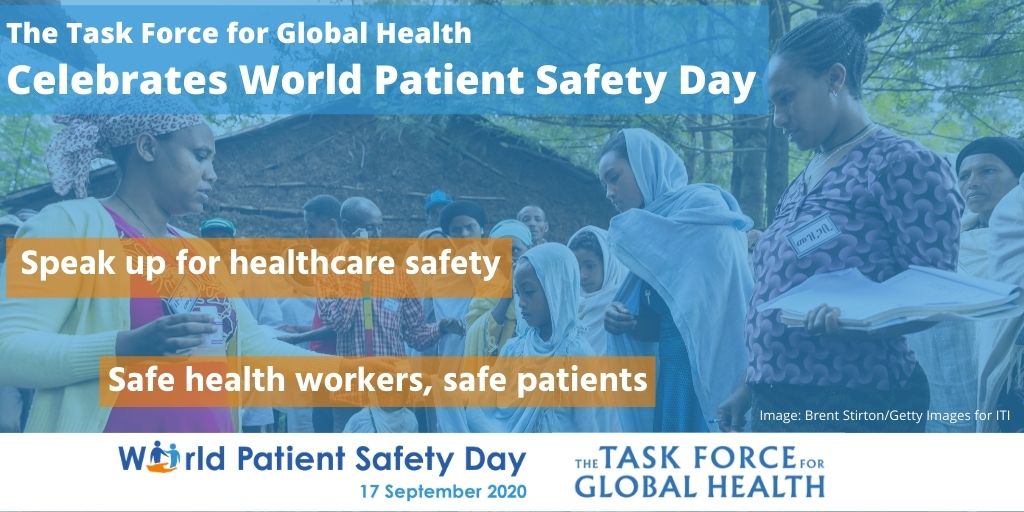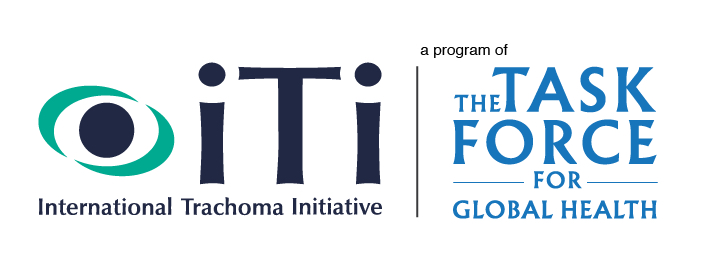The Task Force for Global Health Celebrates World Patient Safety Day, 2020

Written by: David Addiss, Gabriella Corrigan, Paul Emerson, Ashley Graham, PJ Hooper, and Virginia Sarah
Global health programs have two fundamental ethical responsibilities. First, to deliver health benefits to affected populations. And second, ‘do no harm’ – in other words, to provide these benefits as safely as possible.
Thursday, September 17, 2020 is World Patient Safety Day, when health workers around the world celebrate and advance a new World Health Organization (WHO) initiative devoted to improving patient safety, minimizing medical error, and promoting a ‘safety culture’ within health systems. The initiative was launched by a resolution of the World Health Assembly (WHA72.6) in May 2019. WHA72.6 calls on the WHO to develop guidance and tools for patient safety; requests national governments to provide safety training, conduct research, and share best practices; and invites international organizations, such as The Task Force for Global Health, to promote and support these activities.
Programs across The Task Force for Global Health are deeply committed to fostering patient safety and to the principle of 'do no harm.' Two of these programs – the International Trachoma Initiative (ITI) and the Focus Area for Compassion and Ethics (FACE) – have mobilized quickly to respond to WHA72.6 with respect to neglected tropical diseases (NTDs). NTD programmes currently reach more than 1 billion people each year through annual presumptive treatment of at-risk populations, known as mass drug administration (MDA); in-hospital management of patients with serious conditions such as snakebite or visceral leishmaniasis; home-based care for chronic conditions such as lymphedema; and surgery for trichiasis and filarial hydrocele. Given the massive scope and scale of this work, ensuring safety in NTD programmes contributes significantly to safer national health systems.
ITI ensures the safe distribution of Zithromax®, a safe and effective medication that is well-tolerated and has a low incidence of side effects, to approximately 90 million people each year for elimination of trachoma as a public health problem. Beyond that, ITI recently 1) revised its dosing guidelines so that children up to age 7 years and 120 cm in height receive liquid Zithromax®, which is easier to swallow than tablets; 2) supported the Federal Ministry of Health in Ethiopia in a large observational assessment of MDA safety; and 3) published additional guidance on MDA safety in the updated Zithromax® Management Guide.
FACE has been integral to these efforts. In collaboration with ITI and colleagues at The Fred Hollows Foundation and the International Coalition for Trachoma Control, FACE helped to launch a new NTD Safety Commitment at the 2019 annual meeting of the NTD NGO Network (NNN) in Liverpool. The NNN Commitment recommends “providing frontline staff with the skills they need to identify health and safety risks and manage challenging situations.” FACE is currently working closely with the WHO to develop consolidated guidance, training modules, and job aids to improve NTD programme safety. These are just a few practical examples of how NTD programs at The Task Force are applying the principle of ‘do no harm.’
World Patient Safety Day 2020 provides an opportunity to reflect on the extraordinary measures already in place to ensure safety of NTD programs and to redouble our commitment to priority measures, which continue to strengthen and build upon that record. Join us and speak up for NTD safety this World Patient Safety Day!

